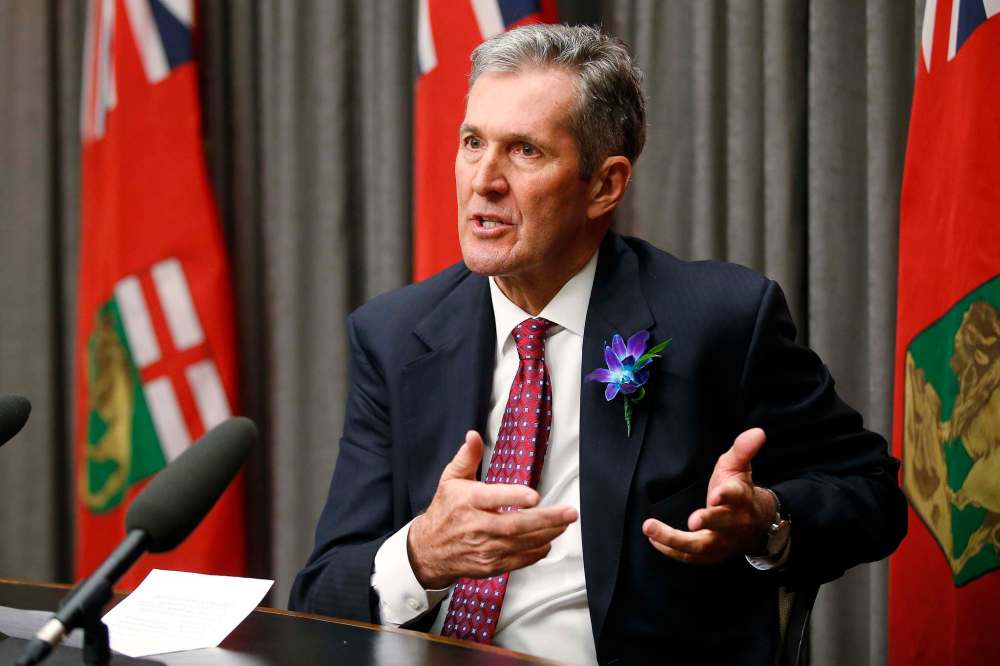Pallister questions long-term value of Ottawa’s media-subsidy plan
Advertisement
Read this article for free:
or
Already have an account? Log in here »
To continue reading, please subscribe:
Monthly Digital Subscription
$0 for the first 4 weeks*
- Enjoy unlimited reading on winnipegfreepress.com
- Read the E-Edition, our digital replica newspaper
- Access News Break, our award-winning app
- Play interactive puzzles
*No charge for 4 weeks then price increases to the regular rate of $19.00 plus GST every four weeks. Offer available to new and qualified returning subscribers only. Cancel any time.
Monthly Digital Subscription
$4.75/week*
- Enjoy unlimited reading on winnipegfreepress.com
- Read the E-Edition, our digital replica newspaper
- Access News Break, our award-winning app
- Play interactive puzzles
*Billed as $19 plus GST every four weeks. Cancel any time.
To continue reading, please subscribe:
Add Free Press access to your Brandon Sun subscription for only an additional
$1 for the first 4 weeks*
*Your next subscription payment will increase by $1.00 and you will be charged $16.99 plus GST for four weeks. After four weeks, your payment will increase to $23.99 plus GST every four weeks.
Read unlimited articles for free today:
or
Already have an account? Log in here »
Hey there, time traveller!
This article was published 23/11/2018 (2577 days ago), so information in it may no longer be current.
Premier Brian Pallister says he is concerned Ottawa’s decision to subsidize news media outlets will undermine their independence and their effectiveness in reporting on national issues.
Pallister said he is not arguing against short-term help for an industry facing transitional challenges, but noted there are possible pitfalls to any prolonged financial aid.
“I think there needs to be some reflection and some consideration given to the potential dangers of such practices if they are long-term,” he told reporters after question period at the legislature on Friday.

“Transitional challenges are real and I respect that, and I understand that the media face those challenges, but so do many other sectors in our society.”
Pallister said long-term media funding by Ottawa would raise concerns about the potential for perceptions of bias.
He said he was not speaking about bias towards the federal Liberals, who are offering the aid, but towards the federal government in general.
“How easy will it be for the media to criticize anyone else, any other group that is in receipt of federal funding in years ahead? That would be difficult. It would seem that there would be a crisis of principle at that point in time. I think there might be a natural reluctance to criticize the hand that is feeding one’s organization,” Pallister said.
Free Press publisher Bob Cox does not buy Pallister’s argument.
“The federal program is going to have no effect whatsoever on journalistic independence or the ability of journalists to comment on any and all government actions, or on the actions of other recipients of government support,” said Cox, chairman of News Media Canada, which has lobbied for newspaper subsidies.
“If you think otherwise, you don’t know much about the history of federal support for journalism. It started prior to 1867 with a postal subsidy to publications so they could be sent to readers in isolated outposts — like Manitoba settlers. That program still exists and funds magazines, community newspapers and farm, business, ethnic and Indigenous publications. Then there is the CBC, federally funded for the past 92 years, with a strong tradition of independent journalism.
“The new program simply recognizes that newspapers and other non-regulated news outlets need help to transition in the digital age, and it’s important to preserve their newsrooms in the interim. It’s important and welcome support, and it will not compromise what we do.”
This week, the federal government announced it would start subsidizing Canadians’ subscriptions and donations to news media as well as newsroom salaries. A panel of journalists would decide which agencies would qualify for support. Ottawa has earmarked $595 million in subsidies over five years, ending in March 2024.
Pallister said the subject needs a public airing, and he’s seen little debate on the issue so far.
“I think the sounds of silence can be most unhelpful at times,” he said.
NDP Leader Wab Kinew said the Progressive Conservatives are trying to use Ottawa’s proposed subsidies for legacy media outlets as a wedge issue in the run-up to the 2019 federal election. He said he doesn’t believe news organizations who accept the funding would allow that to bias their coverage.
“It’s pretty clear that this premier doesn’t have much respect for a free press,” Kinew said, referring to threats to sue the Free Press for its coverage and to legislation passed last session that would no longer require certain government advertising in newspapers. (The government says it will delay proclamation of the advertising provision.)
— with files from Jessica Botelho-Urbanski
larry.kusch@freepress.mb.ca

Our newsroom depends on a growing audience of readers to power our journalism. If you are not a paid reader, please consider becoming a subscriber.
Our newsroom depends on its audience of readers to power our journalism. Thank you for your support.
History
Updated on Saturday, November 24, 2018 7:15 AM CST: Final



